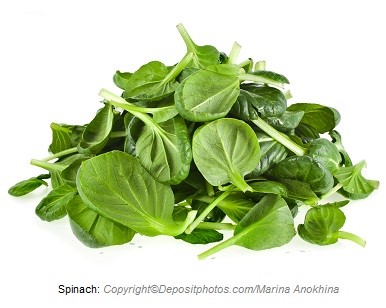Being native to Asia but known worldwide, spinach is a green leafy vegetable  from Amaranthaceae family. One cup of uncooked spinach contains 2 grams of carbohydrates, 1 gram of fiber and 1 gram of protein.
from Amaranthaceae family. One cup of uncooked spinach contains 2 grams of carbohydrates, 1 gram of fiber and 1 gram of protein.
Average calories: 12 per one cup, uncooked.
|
Spinach: one cup, uncooked |
|
|
Carbohydrate |
2 |
|
Fiber |
1 |
|
Protein |
1 |
|
Fat |
0 |
|
Calories |
12 |
Vitamins found in higher amounts: vitamins K, A, C, and B9. One cup of uncooked spinach provides 145 mcg of vitamin K, 2814 IU of vitamin A and 60 mcg of vitamin B9.
Minerals found in higher amounts: manganese, iron, magnesium, and calcium.
Phytonutrients found in higher amounts and their health benefits: the phytochemicals in spinach are carotenoids, phenolic compounds, flavonoids, isothyocyanates, sulforaphane, ecdysterone, and spinosaponins.
Beta-carotene, lutein, zeaxanthin, neoxanthin, violaxanthin, and epoxyxanthophylls are the carotenoids in spinach. They are powerful antioxidants essential for the optimal health of the eyes. Of carotenoids, epoxyxanthophylls demonstrate anti-cancer activity, especially against aggressive prostate cancer.
Flavonoids (kaempefrol) and phenolic compounds (ferulic acid and coumaric acid) are potent antioxidants with anti-inflammatory, anti-cancer and immune-boosting properties.
Spinach is a unique source of methylenedioxyflavonol glucuronides. They are flavonoids with cancer-fighting and anti-inflammatory properties.
Sulforaphane can inhibit the growth of Helicobacter Pylori, a microbe responsible for peptic ulcer and stomach upset. Sulforaphane is also found in Bok Choy,Brussels sprouts, cabbage, cauliflower, kale, collards, kohlrabi, mustard, turnip, radish, arugula, broccoli, and watercress.
Isothiocyanates induce apoptosis (programmed cell death) in certain cancers. However, they interfere with the uptake of iodine. Isothiocyanates can enhance liver detoxification by stimulating both phase I and phase II of detoxification processes.
Spinosaponins are phytonutrients that help reduce cholesterol, ward off cancers and improve cardiovascular health.
Rubiscolin is an opioid peptide found exclusively in spinach. It has analgesic and memory-enhancing effects (see “Rubiscolins” under the section of “Phytonutrients”).
Found also in beets, betaine is a chemical compound found in spinach, 165 mg in one cup of uncooked spinach. Functioning along with vitamins B12, B9 and B6, betaine lowers homocysteine level. Homocysteine increases the risk of cardiovascular diseases. Betaine may have a protective effect against the deposition of fats in the liver (fatty liver).

